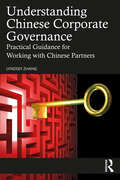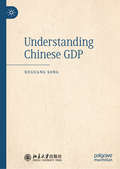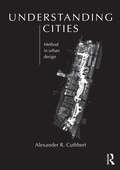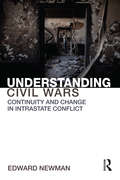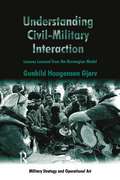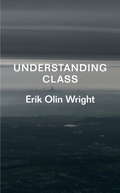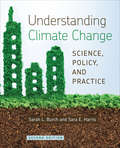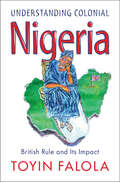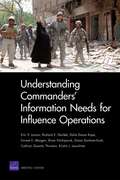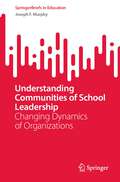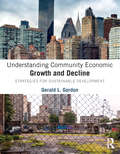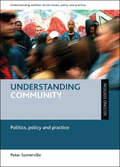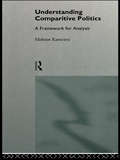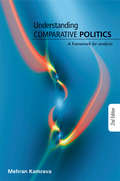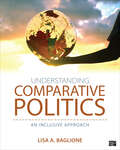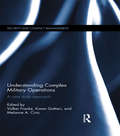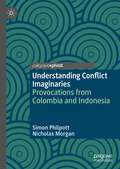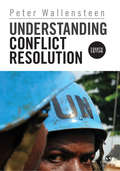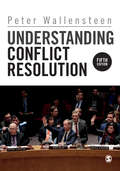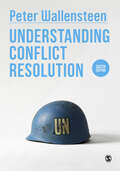- Table View
- List View
Understanding Chinese Corporate Governance: Practical Guidance for Working with Chinese Partners
by Lyndsey ZhangIn a complex political and environmental global landscape, it has never been more critical for global organizations to understand the past, present, and future of Chinese corporate governance: this book is the key. Leveraging her dual-cultural background and using a board-level practitioner’s lens, Lyndsey Zhang offers insights that will help the global business community better understand Chinese companies’ corporate governance practices and economic development journeys, shorten the learning curve for global business leaders and investors, and explore different economic models that better suit emerging markets. She addresses important questions such as: • How does the Chinese government manage to retain its controlling position in Chinese companies while still making them attractive to global investors? • What are the drivers for Chinese companies’ future corporate governance improvement? • What is China’s position on the worldwide ESG and climate change movements? • How can global practitioners feel less like "navigating in the dark" when working with Chinese companies? This book will be an invaluable resource for anyone seeking to understand the rapidly changing world of Chinese corporate governance, including global investors, senior executives in multinational corporations, consultants, financial and political policymakers, business and law students, and researchers.
Understanding Chinese GDP
by Xuguang SongThis book provides in-depth analyses on accounting methods of GDP, statistic calibers and comparative perspectives on Chinese GDP. Beginning with an exploration of international comparisons of GDP, the book introduces the theoretical backgrounds, data sources, algorithms of the exchange rate method and the purchasing power parity method and discusses the advantages, disadvantages, and the latest developments in the two methods. This book further elaborates on the reasons for the imperfections of the Chinese GDP data including limitations of current statistical techniques and the accounting system, as well as the relatively confusing statistics for the service industry. The authors then make suggestions for improvement. Finally, the authors emphasize that evaluation of a country’s economy and social development should not be solely limited to GDP, but should focus more on indicators of the comprehensive national power, national welfare, and the people’s livelihood. This book will be of interest to economists, China-watchers, and scholars of geopolitics.
Understanding Cities: Method in Urban Design
by Alexander CuthbertUnderstanding Cities is richly textured, complex and challenging. It creates the vital link between urban design theory and praxis and opens the required methodological gateway to a new and unified field of urban design. Using spatial political economy as his most important reference point, Alexander Cuthbert both interrogates and challenges mainstream urban design and provides an alternative and viable comprehensive framework for a new synthesis. He rejects the idea of yet another theory in urban design, and chooses instead to construct the necessary intellectual and conceptual scaffolding for what he terms 'The New Urban Design'. Building both on Michel de Certeau's concept of heterology – 'thinking about thinking' – and on the framework of his previous books Designing Cities and The Form of Cities, Cuthbert uses his prior adopted framework – history, philosophy, politics, culture, gender, environment, aesthetics, typologies and pragmatics – to create three integrated texts. Overall, the trilogy allows a new field of urban design to emerge. Pre-existing and new knowledge are integrated across all three volumes, of which Understanding Cities is the culminating text.
Understanding Civil Wars: Continuity and change in intrastate conflict (Routledge Studies in Civil Wars and Intra-State Conflict)
by Edward NewmanThis volume explores the nature of civil war in the modern world and in historical perspective. Civil wars represent the principal form of armed conflict since the end of the Second World War, and certainly in the contemporary era. The nature and impact of civil wars suggests that these conflicts reflect and are also a driving force for major societal change. In this sense, Understanding Civil Wars: Continuity and change in intrastate conflict argues that the nature of civil war is not fundamentally changing in nature. The book includes a thorough consideration of patterns and types of intrastate conflict and debates relating to the causes, impact, and ‘changing nature’ of war. A key focus is on the political and social driving forces of such conflict and its societal meanings, significance and consequences. The author also explores methodological and epistemological challenges related to studying and understanding intrastate war. A range of questions and debates are addressed. What is the current knowledge regarding the causes and nature of armed intrastate conflict? Is it possible to produce general, cross-national theories on civil war which have broad explanatory relevance? Is the concept of ‘civil wars’ empirically meaningful in an era of globalization and transnational war? Has intrastate conflict fundamentally changed in nature? Are there historical patterns in different types of intrastate conflict? What are the most interesting methodological trends and debates in the study of armed intrastate conflict? How are narratives about the causes and nature of civil wars constructed around ideas such as ethnic conflict, separatist conflict and resource conflict? This book will be of much interest to students of civil wars, intrastate conflict, security studies and international relations in general.
Understanding Civil-Military Interaction: Lessons Learned from the Norwegian Model (Military Strategy and Operational Art)
by Gunhild Hoogensen GjørvA novel examination of civil-military interaction in particular between militaries and humanitarian actors, in light of the so-called 'Norwegian model' that espouses a clear divide between political and humanitarian (or military and civilian - the model is in fact unclear) actors, while maintaining a tight coordination between them. The Norwegian government has significantly reduced their own military's capacity in the field of civil-military interaction, raising the question as to whether knowledge and skills in this field are necessary. Using a multi-actor security framework, this book examines whether or not the Norwegian government is correct in its assumptions (about both the model and civil-military knowledge amongst military personnel) and concludes that the Norwegian model is a well-meaning but inefficient and problematic model in reality. Although the case study focuses on Norway, the lessons learned are relevant to all nations engaged in civil-military operations.
Understanding Class
by Erik Olin WrightLeading sociologist examines how different readings of class enrich our understanding of capitalismFew ideas are more contested today than "class." Some have declared its death, while others insist on its centrality to contemporary capitalism. It is said its relevance is limited to explaining individuals' economic conditions and opportunities, while at the same time argued that it is a structural feature of macro-power relations. In Understanding Class, leading left sociologist Erik Olin Wright interrogates the divergent meanings of this fundamental concept in order to develop a more integrated framework of class analysis. Beginning with the treatment of class in Marx and Weber, proceeding through the writings of Charles Tilly, Thomas Piketty, Guy Standing, and others, and finally examining how class struggle and class compromise play out in contemporary society, Understanding Class provides a compelling view of how to think about the complexity of class in the world today.From the Trade Paperback edition.
Understanding Climate Change
by Sarah Burch Sara HarrisConversations about climate change are filled with challenges involving complex data, deeply held values, and political issues. Understanding Climate Change provides readers with a concise, accessible, and holistic picture of the climate change problem, including both the scientific and human dimensions.Understanding Climate Change examines climate change as both a scientific and a public policy issue. Sarah L. Burch and Sara E. Harris explain the basics of the climate system, climate models and prediction, and human and biophysical impacts, as well as strategies for reducing greenhouse gas emissions, enhancing adaptability, and enabling climate change governance. The authors examine the connections between climate change and other pressing issues, such as human health, poverty, and other environmental problems, and they explore the ways that sustainable responses to climate change can simultaneously address those issues.An effective and integrated introduction to an urgent and controversial issue, Understanding Climate Change contains the tools needed for students, instructors, and decision-makers to become constructive participants in the human response to climate change.
Understanding Climate Change: Science, Policy, and Practice, Second Edition
by Sarah Burch Sara E. HarrisConversations about climate change are filled with challenges involving complex data, deeply held values, and political issues. Understanding Climate Change examines climate change as both a scientific and a public policy issue. Sarah L. Burch and Sara E. Harris explain the basics of the climate system, climate models and prediction, and human and biophysical impacts, as well as strategies for climate change adaptation and mitigation. The second edition has been fully updated throughout, including coverage of new advances in climate modelling and of the shifting landscape of renewable energy production and distribution. A brand new chapter discusses global governance, including the United Nations Framework Convention on Climate Change and the Paris Agreement, as well as mitigation efforts at the national and subnational levels. This new chapter makes the book even more relevant to climate change courses housed in social sciences departments such as political science and geography. An effective and integrated introduction to an urgent and controversial issue, this book is well-suited to adoption in a variety of introductory climate change courses found in a number of science and social science departments. Its ultimate goal is to equip readers with the tools needed to become constructive participants in the human response to climate change.
Understanding Colonial Nigeria: British Rule and Its Impact
by Toyin FalolaIn this landmark new history, Toyin Falola analyses the impact of Britain's colonization of Nigeria from the late nineteenth century to 1960, when the country regained independence. Falola covers major events in depth, from the initial conquest and denial of Indigenous sovereignty, to the emergence and functioning of the colonial state, and later nationalist movements, offering fascinating insights into labour and trade relations, regionalism and nationalism, and Nigeria's role during the First and Second World Wars. Understanding Colonial Nigeria assesses the economic, political, social, and cultural changes that culminated in the emergence of a coalition of diverse groups agitating for the end of colonial rule from the 1940s – from labor coalitions and politicians to youth groups and market women. From the country's borders and state structure, to the present conflicts, Falola powerfully reflects on the lasting consequences of British intervention in the affairs of Nigerian states and communities.
Understanding Commanders' Information Needs for Influence Operations
by Eric V. Larson Brian Nichiporuk Dalia Dassa Kaye Forrest E. Morgan Richard E. DarilekDocuments a study whose goals were to develop an understanding of commanders' information requirements for cultural and other "soft" factors in order to improve the effectiveness of combined arms operations, and to develop practical ways for commanders to integrate information and influence operations activities into combined arms planning/assessment in order to increase the usefulness to ground commanders of such operations.
Understanding Communities of School Leadership: Changing Dynamics of Organizations (SpringerBriefs in Education)
by Joseph F. MurphyThis book examines the evolution of schooling from bureaucracy and hierarchy to post-industrial schools, and places teachers’ leadership on center stage at the same time. That is, it asks teachers to deepen leadership in their classrooms and with other teachers. The book carries education and schooling from formal control to a social influence process and addresses the deeply rooted difficulty of focusing too much energy on content. It reveals the strong power of internal and external context and helps educators implant the idea of the school not as a fixed, immutable home, but as a relatively deep social process. It shows how co-leadership comes alive in schools. Communities of schooling is one of the three most critical developments in education in the last 140 years. When it is linked with the two other fundamental reorientations in schooling - “dispersed ownership” and “constructivist work” - it becomes the most powerful force in education since the 1700s. This book shows how communities of schooling replace the earlier pillars of “learning as telling,” “hierarchy of control,” and “non-democratic influence.” The work also explains the meaning and understanding of school work as a social influence process where all school-based educators exert power, but at different levels. The idea of enhancing individual and collective capacity through interdependency, shared work, and collective responsibility is unpacked.
Understanding Community Economic Growth and Decline: Strategies for Sustainable Development
by Gerald L. GordonThis book presents a fully comprehensive look at what all communities—large and small, urban and rural—can do to grow and sustain their local economic bases. It examines the causes of economic decline for localities as well as the economic “product” being marketed to employers, the process of growth, and the means of sustaining economic growth over time. Drawing on the experiences of hundreds of communities and hundreds of leaders around the United States, Understanding Community Economic Growth and Decline outlines the various strategies that have or have not worked to enable or support a general local economic recovery. Exploring many facets of growth and re-growth following periods of economic decline, and offering practical, real-life tactics that have been successfully employed in local and regional economies across the US, this book is required reading for community planners and administrators, those currently working in public administration, and students studying regional planning or economic development.
Understanding Community: Politics, Policy and Practice (Understanding Welfare: Social Issues, Policy and Practice)
by Peter SomervilleThis substantially revised edition of a highly topical text draws upon theory from Marx and Bourdieu to offer a clearer understanding of community in capitalist society. The book takes a more critical look at the literature on community, community development and the politics of community, and applies this critical approach to themes introduced in the first edition on economic development, learning, health and social care, housing, and policing, taking into account the changes in policy that have taken place, particularly in the UK, since the first edition was written. It will be a valuable resource for researchers and students of social policy, sociology and politics as well as areas of housing and urban studies.
Understanding Comparative Politics: A Framework for Analysis
by Mehran KamravaComparative politics has undergone significant theoretical changes in recent decades. Particularly since the 1980s, a new generation of scholars have revamped and rejuvinated the study of the subject. Mehran Kamrava examines current and past approaches to the study of comparative politics and proposes a new framework for analysis. This is achieved through a comparative examination of state and social institutions, the interactions that occur between them, and the poltical cultures within which they operate. The book also offers a concise and detailed synthesis of existing comparative frameworks that, up to now at least, have encountered analytical shortcomings on their own. Although analytically different in its arguments and emphasis from the current "Mainstream" genre of literature on comparative politics, the present study is a logical outgrowth of the scholarly works of the last decade or so. It will be essential reading for all students of comparative politics.
Understanding Comparative Politics: A Framework for Analysis
by Mehran KamravaComparative politics has undergone significant theoretical changes in recent decades. Particularly since the 1980s, a new generation of scholars have revamped and rejuvinated the study of the subject. Mehran Kamrava examines current and past approaches to the study of comparative politics and proposes a new framework for analysis. This is achieved through a comparative examination of state and social institutions, the interactions that occur between them, and the poltical cultures within which they operate. The book also offers a concise and detailed synthesis of existing comparative frameworks that, up to now at least, have encountered analytical shortcomings on their own. Although analytically different in its arguments and emphasis from the current "Mainstream" genre of literature on comparative politics, the present study is a logical outgrowth of the scholarly works of the last decade or so. It will be essential reading for all students of comparative politics.
Understanding Comparative Politics: An Inclusive Approach
by Lisa A. Baglione"Baglione speaks cogently to our current generation of college students, who came of age amidst resurgent racism and an unprecedented pandemic." —Audie Klotz, Syracuse University It’s time for a new approach to help students engage more fully with comparative politics. By elevating all the components of identity as core elements of any political system, Lisa A. Baglione′s Understanding Comparative Politics helps students better appreciate the lived realities of people around the world. The book puts issues of race, gender, ethnicity, and religion in context, encouraging students to think critically about world regions and individual countries through the lens of current issues like social justice movements and the COVID-19 pandemic. Throughout the book, Baglione empowers students to be active learners in this sometimes-daunting subject by engaging them in important questions, grounding them in foundational concepts like geography, and helping them make personal connections. This title is accompanied by a complete teaching and learning package. Learning Platform / Courseware Sage Vantage is an intuitive learning platform that integrates quality Sage textbook content with assignable multimedia activities and auto-graded assessments to drive student engagement and ensure accountability. Unparalleled in its ease of use and built for dynamic teaching and learning, Vantage offers customizable LMS integration and best-in-class support. It′s a learning platform you, and your students, will actually love. . Assignable Video with Assessment Assignable video (available in Sage Vantage) is tied to learning objectives and curated exclusively for this text to bring concepts to life. LMS Cartridge: Import this title’s instructor resources into your school’s learning management system (LMS) and save time. Don’t use an LMS? You can still access all of the same online resources for this title via the password-protected Instructor Resource Site.
Understanding Comparative Politics: An Inclusive Approach
by Lisa A. Baglione"Baglione speaks cogently to our current generation of college students, who came of age amidst resurgent racism and an unprecedented pandemic." —Audie Klotz, Syracuse University It’s time for a new approach to help students engage more fully with comparative politics. By elevating all the components of identity as core elements of any political system, Lisa A. Baglione′s Understanding Comparative Politics helps students better appreciate the lived realities of people around the world. The book puts issues of race, gender, ethnicity, and religion in context, encouraging students to think critically about world regions and individual countries through the lens of current issues like social justice movements and the COVID-19 pandemic. Throughout the book, Baglione empowers students to be active learners in this sometimes-daunting subject by engaging them in important questions, grounding them in foundational concepts like geography, and helping them make personal connections. This title is accompanied by a complete teaching and learning package. Learning Platform / Courseware Sage Vantage is an intuitive learning platform that integrates quality Sage textbook content with assignable multimedia activities and auto-graded assessments to drive student engagement and ensure accountability. Unparalleled in its ease of use and built for dynamic teaching and learning, Vantage offers customizable LMS integration and best-in-class support. It′s a learning platform you, and your students, will actually love. . Assignable Video with Assessment Assignable video (available in Sage Vantage) is tied to learning objectives and curated exclusively for this text to bring concepts to life. LMS Cartridge: Import this title’s instructor resources into your school’s learning management system (LMS) and save time. Don’t use an LMS? You can still access all of the same online resources for this title via the password-protected Instructor Resource Site.
Understanding Complex Military Operations: A case study approach (Routledge Studies in Security and Conflict Management)
by Volker Franke Karen Guttieri Melanne A. CivicThis volume provides materials for active learning about peacebuilding and conflict management in the context of complex stability operations. Today, America faces security challenges unlike any it has faced before, many of which requiring lengthy U.S. involvement in stability operations. These challenges are exceedingly dynamic and complex because of the ever changing mix and number of actors involved, the pace with which the strategic and operational environments change, and the constraints placed on response options. This volume presents a series of case studies to inspire active learning about peacebuilding and conflict management in the context of complex stability operations. The case studies highlight dilemmas pertaining to the story of the case (case dilemma) and to its larger policy implications (policy dilemma). The cases stimulate readers to "get inside the heads" of case protagonists with widely differing cultural backgrounds, professional experiences, and individual and organisational interests. Overall, Understanding Complex Military Operations challenges the reader to recognize the importance of specific national security related issues and their inherent dilemmas, deduce policy implications, and discern lessons that might apply to other – perhaps even non-security related – areas of public policy, administration, and management. This volume will be of much interest to students of conflict prevention, transitional justice, peacebuilding, security studies and professionals conducting field-based operations in potentially hazardous environments.
Understanding Conflict Imaginaries: Provocations from Colombia and Indonesia (Rethinking Peace and Conflict Studies)
by Nicholas Morgan Simon PhilpottThis Palgrave Pivot argues that if we are to understand civil conflict we need to grasp how everyday life is shaped by local conflict imaginaries. In order to examine this claim the book sets out to explore the contours of conflict imaginaries from two very different sites of conflict. Both Colombia and Indonesia have suffered from the collective trauma of political violence but in very different social, cultural and political contexts. Sketching out what they mean by a conflict imaginary, and explaining the relationship of this key concept to social imaginaries more broadly, the authors provide a historical overview of how political violence has been represented in both countries. They go on to outline the original qualitative research methods used to provide empirical evidence for the importance of conflict imaginaries, methods which allow them to explore the images and metaphors that underpin the spatial, chronological and emotional cartographies through which people make sense of political violence. With an emphasis on the construction of place-based knowledge, they consider the role of the local, the national and the global in the imagining of civil conflict, and show how film can be used to explore the imaginative worlds of social actors living alongside violence, revealing in the process the need to take seriously their hopes, fears, dreams and fantasies.
Understanding Conflict Resolution
by Peter WallensteenThis book provides you with the perfect introduction to your studies in peace and conflict resolution and equips you with the tools you need to analyse real-world cases. Drawing on recent research and examples from around the world, the new edition: Explores the ongoing situation in Syria and the events and repercussions of the Arab Spring Examines the issue of internet security and the relationship between social media and peace Draws on the cases of Libya and Syria to discuss the principle of Responsibility to Protect (R2P) Outlines the functions of key regional and Non-Governmental organisations Includes a companion website with annotated further reading lists, and links to free SAGE journal articles, reports and data sets This is an essential text for all students, lecturers and researchers of peace and conflict resolution in international relations, global politics and political science.
Understanding Conflict Resolution
by Peter WallensteenThe eagerly awaited new edition of this highly-popular text continues to be the most lucid and engaging book available on conflict resolution and peace agreements. Peter Wallensteen, a renowned academic in the field, draws on recent research and examples from around the world, linking the theory of conflict resolution to real-world cases throughout the book. NEW to the third edition: * Expanded coverage of the making of peace agreements, including peace and justice, disarmament, and gender-peace connections * Coverage of the actions of the Obama administration * Explores the ongoing situations in Afghanistan, Iraq, Somalia, Sudan, the Cote D'Ivoire, Iran, Pakistan and the Arab democratic wave from a conflict resolution perspective * Updated coverage of the continuing 'war on terror'. * Attention is given to the comparison of different outcomes, whether negotiated between parties or victory of one over the other with references to Sri Lanka, the Middle East, and Liberia. Understanding Conflict Resolution remains an essential text for all students, lecturers and researchers of peace and conflict resolution in international relations, global politics and political science.
Understanding Conflict Resolution
by Peter WallensteenUnderstanding Conflict Resolution is a comprehensive introduction to the study of peace and conflict studies. It explores both the historical roots of the study of conflict management, as well as the contemporary settings and the tools available to states, regional and global organizations where these core ideas apply. Drawing on cutting-edge research and examples from around the world, the fifth edition includes: Three new chapters on the key threats and hopes emerging post-2010: one-sided violence, including genocide and terrorism;gendering international affairs; and climate challenges stemming from global warming and the danger of nuclear war Brand new case studies focusing on contemporary events and issues: ISIS; Brexit; Nuclear Arms Race; Refugees as a weapon of war. Learning features such as graphs, data sets, a glossary, annotated further reading lists, and access to a companion website full of online resources. This is an essential text for all students, lecturers and researchers of peace and conflict resolution in international relations, global politics and political science.
Understanding Conflict Resolution
by Peter WallensteenUnderstanding Conflict Resolution is a comprehensive introduction to the study of peace and conflict studies. It explores both the historical roots of the study of conflict management, as well as the contemporary settings and the tools available to states, regional and global organizations where these core ideas apply. Drawing on cutting-edge research and examples from around the world, the fifth edition includes: Three new chapters on the key threats and hopes emerging post-2010: one-sided violence, including genocide and terrorism;gendering international affairs; and climate challenges stemming from global warming and the danger of nuclear war Brand new case studies focusing on contemporary events and issues: ISIS; Brexit; Nuclear Arms Race; Refugees as a weapon of war. Learning features such as graphs, data sets, a glossary, annotated further reading lists, and access to a companion website full of online resources. This is an essential text for all students, lecturers and researchers of peace and conflict resolution in international relations, global politics and political science.
Understanding Conflict Resolution
by Peter WallensteenThe definitive textbook from one of the most-cited scholars in the field of peace and conflict research. Understanding Conflict Resolution - the updated Sixth Edition - is a contemporary and fully revised introduction to resolving wars within and between states. It illustrates the ways to secure peace in the aftermath of all forms of political violence: from using armed force against civilians to gender-based violence; genocide to terrorism. Building on the many peace agreements that have been concluded in the past 30 years, this book draws on the UCDP, a definitive source for data on conflicts, wars and peace, and offers pathways to peace agreements in today’s increasingly unpredictable global political landscape. Featuring the latest research and with examples throughout, including an analysis of the origins and dynamics of the Russia-Ukraine war, this text introduces the tools to understand conflict resolution and analyse future challenges to global peace. This new edition has been fully revised and updated. It includes a contemporary focus on issues and examples that reflect the dynamics of political conflict today, and the addition of three cases to demonstrate application of theory and conclusions drawing from the latest research and up-to-date UCDP data. The perfect guide for undergraduate and postgraduate students taking Peace and Conflict courses, and wider Programmes in Negotiations, Mediation, and the UN. Peter Wallensteen is a leading expert on international peace, Senior Professor of Peace and Conflict Research at Uppsala University, Sweden, and the founder and former director of UCDP, the Uppsala Conflict Data Program. He holds the position of Richard G. Starmann, Sr. Professor Emeritus in Peace Studies, Kroc Institute for International Peace Studies, University of Notre Dame, US.
Understanding Conflict Resolution
by Peter WallensteenThe definitive textbook from one of the most-cited scholars in the field of peace and conflict research. Understanding Conflict Resolution - the updated Sixth Edition - is a contemporary and fully revised introduction to resolving wars within and between states. It illustrates the ways to secure peace in the aftermath of all forms of political violence: from using armed force against civilians to gender-based violence; genocide to terrorism. Building on the many peace agreements that have been concluded in the past 30 years, this book draws on the UCDP, a definitive source for data on conflicts, wars and peace, and offers pathways to peace agreements in today’s increasingly unpredictable global political landscape. Featuring the latest research and with examples throughout, including an analysis of the origins and dynamics of the Russia-Ukraine war, this text introduces the tools to understand conflict resolution and analyse future challenges to global peace. This new edition has been fully revised and updated. It includes a contemporary focus on issues and examples that reflect the dynamics of political conflict today, and the addition of three cases to demonstrate application of theory and conclusions drawing from the latest research and up-to-date UCDP data. The perfect guide for undergraduate and postgraduate students taking Peace and Conflict courses, and wider Programmes in Negotiations, Mediation, and the UN. Peter Wallensteen is a leading expert on international peace, Senior Professor of Peace and Conflict Research at Uppsala University, Sweden, and the founder and former director of UCDP, the Uppsala Conflict Data Program. He holds the position of Richard G. Starmann, Sr. Professor Emeritus in Peace Studies, Kroc Institute for International Peace Studies, University of Notre Dame, US.
